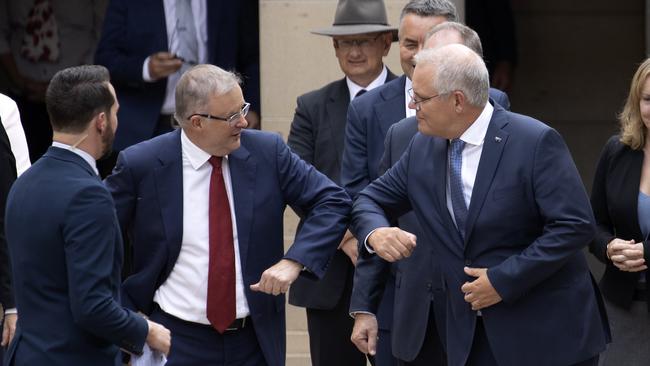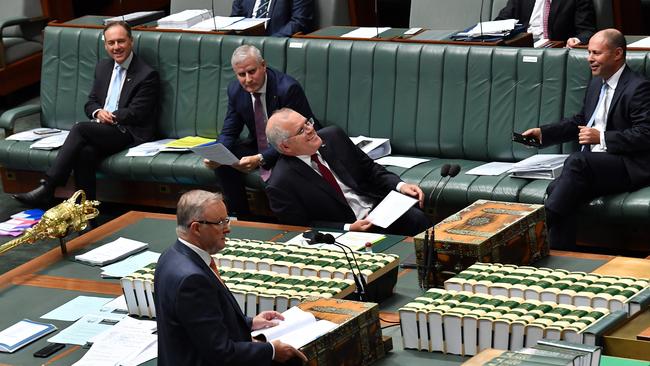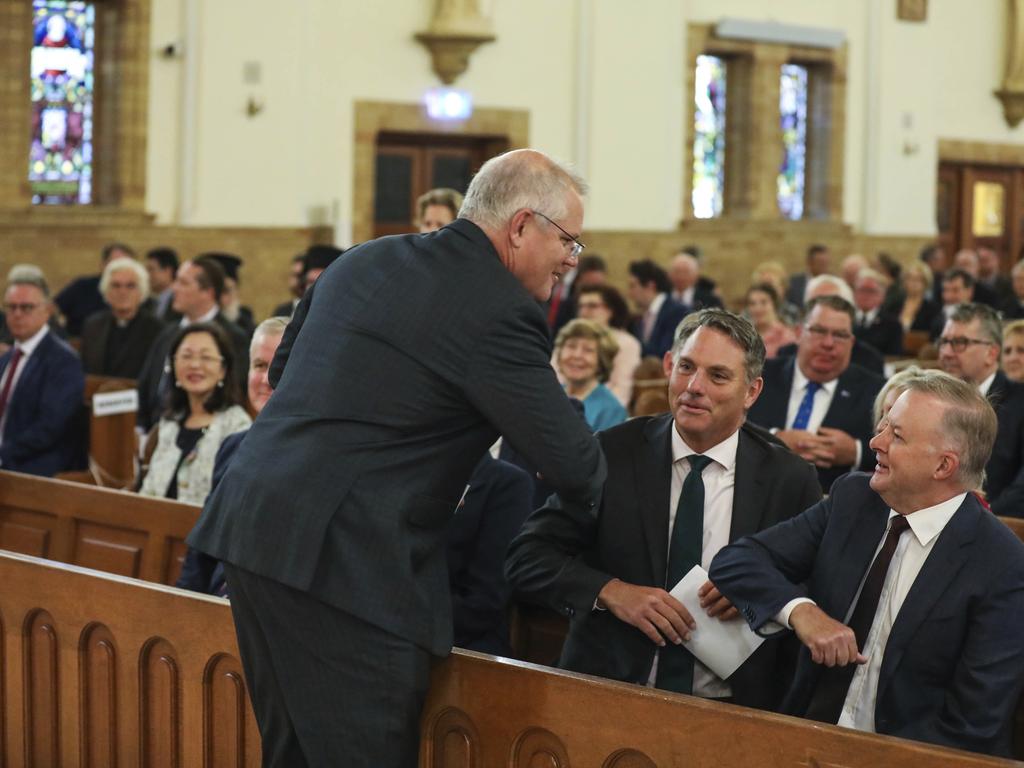Back to work, and a fresh list of priorities
Scott Morrison has showed a deft touch to outperform rival Anthony Albanese.

After just a week of parliament it is clear Scott Morrison and Anthony Albanese face broader tests and challenges than they faced last year. These include energy and climate change, industrial relations, welfare payments, budget deficits, national debt, Indo-Pacific security, aged care, political cohesion and their leadership stability.
After a disrupted year of federal politics it is apparent the Prime Minister — who has benefited from incumbency, as have the state and territory leaders — has demonstrated a superior ability to adapt to the politics of bipartisanship, to focus on people’s greatest concerns, to dump ideology, to consolidate his leadership and prepare an agenda beyond “looking into the abyss”.
As Opposition Leader and faced with an almost impossible task, Albanese, who is an aggressive tactician, has struggled with the demands of bipartisanship. He has lacked consistency and overreached by linking Morrison to Donald Trump and US violence. He also has exacerbated internal divisions with his shadow ministry shuffle; he is not challenging the Coalition in parliament and faces several policy dilemmas.
Newspoll surveys published this week show Morrison’s ascendancy over Albanese and the Coalition’s continuing strength in primary vote support. They show too that the public overwhelmingly approves of the way state and federal governments handled all aspects of the first pandemic year. But that success means the perspective and expectations of the public will change this year as complacency sets in, comparisons with disasters in other countries begin to lose potency and the real impact on jobs is felt.
At the National Press Club on Monday, Morrison delivered a national midterm report — there must be an election called in the next 14 months — and an agenda for the next year. That agenda was a list of policy priorities but also the blueprint for winning the next election.
“We must take these lessons (of 2020) into 2021 and continue to make our own way through this crisis,” he said. “Our Australian way … A response that is proportionate, timely, scalable and targeted … And a response where emergency measures are temporary and accompanied by a clear fiscal exit strategy.” He reduced this goal to not running the economy “on taxpayers’ money forever” and said there was “no budget blank cheque”.
He also listed five priorities: suppress the virus; cement the economic recovery; provide essential services; national security; and “care for our country”, which included climate change.

Albanese, having delayed his frontbench shuffle, was in no position to lay out a comprehensive agenda that would require policy commitments he has been reluctant and unable to make. As he promised to make significant announcements next week, the Opposition Leader said: “We will continue to roll out policies between now and the next election so that everyone will see clearly what the suite of alternative policies that a Labor government would implement to make the recovery even stronger.”
But Morrison is a clear frontrunner, more flexible, more pragmatic, more consistent and careful, and prepared to exploit Labor’s internal divisions. He has described the ALP as “a fight club that can’t compete with itself” and as “overreaching” politically.
Labor has been caught s hort with claims there would not be enough vaccines and that hotel quarantine was unsustainable and Morrison had to take over.
Friday’s national cabinet meeting of all government leaders, including a majority of ALP leaders, welcomed the extra 10 million vaccine shots revealed on Wednesday and endorsed the continued centrality of hotel quarantine run by the states.
Labor’s desperation and frustration keep drawing it into criticising health protections or economic support without knowing about imminent developments or allowing for the rhetoric of the Labor premiers.
With his ministerial reshuffle after the resignation of finance minister Mathias Cormann, Morrison made minimal changes just before Christmas to give new ministers time to settle into their portfolios before parliament resumed.
Forced into a shadow ministerial reshuffle because of internal demands, Albanese dumped long-time climate change spokesman and ally Mark Butler, demoted people seen as potential leaders, and created competing and confusing responsibilities.
Morrison continued to declare Australia would “meet and beat” its carbon emission reduction targets and stood by a preference for net zero greenhouse gas emissions by 2050. His mantra is that he will reduce them by technology, “not taxes”, and he harks back to Labor’s notorious broken carbon tax pledge in 2010 and the ALP’s massive new tax plan in 2019.
Albanese has committed to 2050 net zero emissions but remains stranded on the medium-term targets for 2030 in full knowledge Morrison will cost any targets he adopts before the election and that the uncosted climate change targets severely damaged Bill Shorten’s 2019 campaign.
He also knows he is in no position to give the same messages to the climate change cohort in suburbs of Melbourne and to miners in Queensland. It is a dilemma underlined by his creation of a frontbench role of spokesman for Queensland resources.
Morrison, while saying pandemic payments, supplements and support under emergency employment, welfare and business programs must be tapered to begin a return to fiscal responsibility, leaves open the option of extending support, particularly for tourism, beyond March 31. He even is allowing speculation that there may be a permanent rise in Newstart because of the blip expected in jobless figures in April and May.
Obviously appealing to conservative instincts within the Coalition by not writing a blank budget cheque with endless debt, Morrison still has non-ideological capacity to adapt and extend payments.
Albanese’s position has been to extend emergency job support beyond next month and to raise Newstart. He will claim a victory if Morrison extends the payments but the credit will go to the Prime Minister for making the decision.
Morrison has the fallback position of pointing to the transition or graduation back to work of 90 per cent of those who were unemployed last year and on JobKeeper and JobSeeker.
With the endorsement of Reserve Bank of Australia governor Philip Lowe this week of the positive impact of the payments and the faster than expected return to growth, Morrison is on firmer ground than Albanese.
Morrison is also appealing to conservatives who want industrial relations reform by introducing the omnibus bill on casual employees, but he continues to be cautious, offering “modest” reforms that also clamp down on wage theft by bosses.
With the backing of a ferocious union campaign Albanese has decided to oppose the industrial relations bill completely in an extension of the campaign for higher wages at the last election and in the hope of a Howard government-style backlash in 2007 against the far more ambitious Work Choices legislation. Labor’s strategy is also aligned with the campaign run in the 2019 election on stagnant wages growth.
But total opposition looks to be a strategic mistake: Labor is opposing laws aimed at stopping wage theft and helping get permanent status for casual workers while, once again, handing the carriage of important legislation to three or four independent senators.
There is also the political risk that more people will align themselves with Morrison’s declaration of trying to “get more people into jobs” rather than Labor’s push for higher wages.
If the industrial relations changes pass it will be a victory for Morrison and will help him within his own ranks while Albanese will face further recriminations from his colleagues.
Morrison’s leadership strength and parliamentary advantages are also clearly superior to Albanese. It was an extraordinary parliamentary sight to see a Prime Minister round on one of his backbenchers in the chamber for controversial views on coronavirus vaccines and give the Opposition Leader, through standing orders, the opportunity to do likewise.
Yet what was more extraordinary was that Morrison has a majority of one: the most dramatic consequence was the vague possibility that Liberal MP Craig Kelly could stand for the Nationals at the next election.
Every day of Julia Gillard’s minority government and every vote when Malcolm Turnbull’s government could be defeated on the floor of the House of Representatives generated drama and predictions of doom. But Morrison’s position is so strong he governs as if he has a majority of 10.
The dissatisfaction with Albanese’s leadership is such that he could not contemplate repudiating a colleague in parliament, no matter the problem.
The Coalition strength in the primary vote in Newspoll this week, even if there is an election this year, is no guarantee of a Morrison success as he seeks a fourth term. Labor will improve. But it is clear that Morrison is better prepared, more secure and confident than Albanese, who lost the first week of parliament and now has even more ground to make up.







The politics of 2021, like last year, will be dominated by COVID-19 as the vaccine rolls out and the economy recovers. But there will be a change in tempo and tone, with less sense of emergency and a demand to address issues beyond the coronavirus.